- Home
- Roger Zelazny
The Black Throne Page 9
The Black Throne Read online
Page 9
At the corner we turned left upon a broader thoroughfare. Here, considerable carriage and cart traffic hurried past, as well as horseback riders and pedestrians.
"Along this way we should find transportation," Marie remarked.
Five minutes later we were passing a flower seller's stall, a number of people gossiping or staring before the racks of dried arrangements. Just as we went by an elderly man stepped toward us from beyond the next stall—where cheap scarves were being sold—and the moment his eyes fixed upon mine, a bright glint of lunacy within them, I knew that all was not quite well. He was poorly dressed, save for an expensive ring on his left hand, and in that instant I realized it was not the hand of an old man. A quick step and he was at my side, right hand emerging from behind his hip, a flash of steel within it.
I moved forward as he struck, blocking the thrust with my forearm. I punched toward his midsection, and though he blocked it his breath was expelled and he jerked as if my blow had landed. It was several moments before I realized that Peters had delivered a kidney punch at that instant. By then the man had lurched past me and commenced running, his blade fallen at my feet. I turned as if to give pursuit but Marie's hand fell upon my arm.
"'E is but a common thug," she said. "I have seen him about. There is no need to pursue. We will know his employer by this evening."
The man had already disappeared into a space between two buildings. I shrugged and kicked the knife. It slid about eight feet. Grinning, Peters gave it another kick and it bounced along, coming to rest six or so feet ahead of him. When next we came to it I kicked it, and so on until we found a carriage.
As we rode along she gave me a quick lesson on the town's disposition and taught me my first words of French. We rattled on for some time through the Fauborg St. Germain. The skies spat a few drops of rain upon and about us for perhaps two minutes then desisted. Occasional wraiths of fog hovered at the feet of hills and among trees.
At length we found ourselves traversing the Rue Dunot. The carriage slowed as we neared a grotesque and time-eaten mansion. Its crumbling eminence caused me to construct visions of the impoverished nobility when I saw its number to be the one we sought.
"C'est le maison de Monsieur Dupin?" I said proudly.
"La maison," she said.
"But that's the place all right?"
"Indeed."
She paid the driver and we descended. As the carriage rattled away we approached the doorstep, where Marie drew upon the bell-pull. Shortly thereafter the door was opened by an elegant young man—both in appearance and dress—who was obviously not a servant. He and Marie exchanged rapid-fire French for several minutes before he shifted his attention to Peters and myself.
"I am sorry," he said in an unusually rich tenor, "but the information could not wait. You are looking for Von Kempelen." It was a statement, not a question. "Please come in."
He stepped aside and held the door for us. We entered, and he closed it behind us. "Come this way."
The place was musty and filled with shadows. The floor creaked beneath our feet. He led us down a corridor past dim rooms filled with ancient furniture. At length, we came to a study, somewhat better illuminated but as venerably furnished as the chambers we had passed. Within, a goblinesque voice shouted an amazing litany of obscenities as we entered.
"The same to you, mate!" Peters retorted, turning quickly to seek the source of the challenge.
"Grip, be still!" Dupin ordered. "Attend now! Repeat! The flames in Spain burn heretics amain!"
"Rawk!" said what I then saw to be a raven perched on a shelf above the door. It followed this with the sounds of champagne bottles being uncorked.
"Nevermore, Grip. Nevermore," Dupin persisted.
"Rawk," repeated the bird, followed by obscenities I had heard but seldom for all my years in the Army, save from the lips of an Arkansas mule driver who had complained earlier that day on the recurrence of a vicious rectal itch.
"Nevermore," said Dupin.
"Je m'en fiche," said the raven.
Our host swept past us, saw us seated in attractive and uncomfortable chairs of a gold and rose floral pattern, then offered us sherry.
"I write a bit of poetry," he confessed, "and it amuses me, teaching a few aphorisms to the bird.
However, his previous owners were less than careful when it came to influences."
I refrained from inquiring concerning Grip's former residence.
"But he was an experienced speaker and a bargain, to boot," he finished. "Now, concerning Von Kempelen, his whereabouts are known to me. I make it a point to keep posted on the location of eminent visitors. Your problem as I understand it, however, entails more than simply finding the man."
"True," I replied. "The man is reputed to have developed a process whereby he can transmute baser metals to gold."
Dupin smiled.
"So I understand," he observed. "Many have made such claims, down the centuries."
"As I understand it, Von Kempelen is rather reticent concerning the process. Be that as it may, he is being followed by three men who wish to obtain the secret from him."
"By fair means or foul?"
"Fair, I'd judge. A process so complicated is not easily taken against a person's will. I believe they'd be willing to strike a genuine deal with him."
"What is the problem you seek to solve?" he asked.
I took a sip of the sherry.
"My problem is not the same as my employer's," I told him. "Seabright Ellison wishes to prevent such a deal because the appearance of large quantities of alchemical gold on the world market could damage his own position in that area, where he is strongly represented."
"Indeed," Dupin observed, "more than our employer might be injured by the injudicious release of great masses of precious metal. Look what the gold of Mexico and Peru did to Spain. Her present troubles—from the Inquisition through this hit or miss war—may all owe something to the effects of its superabundance on the economy of an earlier day. How far is Mr. Ellison prepared to go in foiling this transaction?"
"Pretty far," I said, recalling his hint that Griswold, Templeton, and Goodfellow's relocation underground would earn me a bonus.
"Might he be willing to outbid the others for the secret?"
Thinking of the massive sums commanded by my letters of credit, I nodded.
"I have been given considerable discretion in this area," I said, "and the funds with which I might attempt such a thing. What do you think?"
"I do know that Von Kempelen has met on several occasions now with a trio of foreigners—most likely American. So I would guess that they are talking business. On the other hand, I daresay he is suspicious of them—as he must be of anyone, under the circumstances."
"I suppose so."
"There may be a way to capitalize on this ..." he mused. "But tell me, what did you mean when you said that your problem is not the same as your employer's?"
"He wants to stop the deal because he's interested in protecting his financial interests. My interest is in the lady Griswold has kidnapped and still holds prisoner. She possesses psychic abilities and he used her to track Von Kempelen here. He has other, darker plans for her."
"Ah! There is a woman involved!" He leaned forward and squeezed my forearm. "I understand."
"Partly, I'd imagine," I replied. "But I would be very surprised if even a Frenchman could unravel this particular relationship too readily."
"You have roused my curiosity to the utmost," he said. "Pray, tell me of it."
So I did. Forgetting myself, I drank four of the tiny glasses of sherry as I spoke. In that I did not stagger off with delirium tremens, the performance may have helped to convince him I was telling the truth.
"Yes," he said, nodding, "it seems a relatively simple matter to one who is familiar with the German philosophers, particularly Leibnitz. The notion of a multiplicity of existences—"
"Dreck! Dreck!" cried Grip, flying down from his shelf and lighting upon Dup
in's left shoulder. "Guvna!
Scheiss! Mierda!"
"Hush, Grip!" Dupin ordered. "Alternate levels of reality do, as I was saying, become comprehensible when one considers the projective geometries of Desargues in light of Gauss's unfinished work on a calculus of probabilities—"
Marie Roget cleared her throat and rose to her feet.
"Excuse me," she said, "but I thought you had further instructions for me. If not, I must look into the matter of the assassination attempt on Mr. Perry."
"Yes, I was about to suggest some lines of inquiry."
She said something in French and Dupin rose to his feet. He glanced at Peters and myself, said, "Excuse me, gentlemen. I must see the lady to the door," and departed with her, speaking in French as they went.
"You understand what he was sayin', boss?" Peters asked. "'Bout them German philosophers and all?"
I shrugged.
"It seemed he was headed in a highly theoretical direction."
"Let's try changin' the subject on him when he comes back. That bird's got the right idea."
When Dupin returned several minutes later, Grip having transferred himself to his right shoulder, he cast his gaze from me to Peters and back again, then asked, "Where was I?"
"Concerning the matter of Von Kempelen ..." I suggested.
"Oh yes," he said, "the creator of the so-called chess-playing automaton. A fraud, of course, as no machine can be made to play chess, it being a creative rather than a mechanical process."
"I suppose," I said.
"Furthermore, if one could build such a device," he went on, "it must inevitably win every game. The principle being discovered by which a machine can be made to play a game of chess, an extension of the same principle would enable it to win a game. A further extension would enable it to win all games—"
"Uh," I interjected, "it was his alchemical discoveries with which we were mainly concerned."
"Of course. Forgive me," he agreed. "A fascinating subject, alchemy. I—"
"How do you think we might get into his good graces to the point where he'd even be willing to acknowledge the existence of the process?"
"Hm. Several possibilities occur," he observed. "Generally, the simplest deception is the easiest to achieve and maintain. A moment... . I have it. You are two visiting Americans who happened to recognize him on the street. You present yourselves as such at his apartment, expressing a desire to meet the inventor of the chess-playing automaton. To gain access, you might even offer to bet him a large sum of money that one of you can beat the automaton. No need to worry on this account, for even if the game is begun it will never be completed."
"Why not?" I asked.
"You arrive at his apartment at eight o'clock this evening. Before then I will have spoken with Henry- Joseph Gisquet, our Prefect of Police, who owes me several favors. He will see that the neighborhood is unpoliced at that hour and he will provide me with several footpads who owe him favors. I will cause these men to break in at nine o'clock, as if intent on theft and violence. You and your companion will grapple with them and they will flee. This should serve to ingratiate you with Von Kempelen to the extent where he would welcome your company for purposes of protection. Continue your supposed fascination with his work and become friendly with him. After a day or so, introduce the subject.
Impugn Griswold and Company if necessary, and offer to outbid them."
I glanced at Peters, who was nodding.
"Not bad," he said, "on short notice—and I've a feelin' we should be movin' fast."
"In the meantime," Dupin continued, "there is a Minister Dupin—odd coincidence, eh?—though the resemblance stops with the name; the man is a dreadful poseur—who may know whether Von Kempelen has actually made overtures to bail our government out of its latest crisis with buckets of gold. I may be able to learn what, if anything, the minister knows of the matter—which could cast illumination on your own prospects."
"We'd be very grateful for the effort."
He waved a hand, causing Grip to raise his wings and hiss.
"Save the gratitude for favors," he said. "I will have to prepare a bill for extraordinary services on this one.
"By the way, is there any possibility I might draw some of it on account today?" he added.
"Surely," I said. "I was planning to stop by one of the banking houses this afternoon, as I might be needing some extra cash myself. If you'll provide me with Von Kempelen's address—perhaps sketch me a map—and let me know how much you'll need, I'll be on my way."
He repaired to a small writing table where he scribbled and drew these items.
"If you're planning on returning to the Eidolon when you've finished in town," he said, "I'll be in touch with you there, to let you know that things are ready for this evening—and to pick up my advance."
"Excellent," I said, as he saw us to the door. "We'll be back aboard ship in a few hours. Thank you again."
"No problem," he replied. "By the way, might I have the loan of twenty francs till then?"
"Of course," I said, removing a note from one of the rolls of bills I had found in Ellison's safe and passing it to him.
"Pay you later," he said.
"Nevermore," said the raven, as the door closed behind us.
* * *
That evening, dressed warmly against a chilly wind, Peters and I set out to find Von Kempelen's place.
In that Peters was unwilling to do without Emerson's skills in the event of an emergency, the ape followed us along the way. The people of the city were generally unaware of his passage over their rooftops in the darkness. The dogs of Paris did, however, take notice. Their barks and howls followed us from street to street.
Peters whistled as we walked along, at one point laughing maniacally when the dogs broke into a particularly wild cacophony, causing a woman who passed us just then to cross herself and hurry away.
At length, we found ourselves in the proper neighborhood, and there was indeed a light burning behind the top floor window which seemed to belong to the apartment we sought, a building bearing the legend Porte D'Eau.
"You think he'd do himself better'n a bloody garret," Peters muttered, "bein' worth a fortune an' all."
"He's trying to be inconspicuous," I said.
"He could do it at ground level," he growled.
Firing a quick phrase of his gutter French at the concierge who answered his pounding, Peters had us admitted by a frightened-looking man who stared out to where a ring of dogs had formed at our back in the street.
"Porquoi les chiens aboient-ils?" he asked.
"Je suis loup-garou," Peters replied. "Je veux Von Kempelen."
The man stared, then Peters laughed his crazy laugh again. Smiling weakly, the concierge got out of our way.
"Trois?" Peters asked.
"Oui."
"Merci," I said, not to be outdone, and we mounted the stair.
All the way up to the top we went, then knocked upon his door. There was no answer. We waited a few moments then tried again.
The third time I called out as I knocked, "Von Kempelen! It's important, and I think you'd be interested.
It would certainly be worth your while."
The door opened a crack and a large blue eye regarded us.
"Ja?" asked its owner.
"We're Americans," I said, "and I believe you are the creator of the famous chess-playing automaton."
"And so?" he said. "If I am, what then?"
I produced a wad of Yankee dollars—again, courtesy of Ellison's safe—and waved them at him.
"I'm a representative of the Baltimore Chess Club," I said. "I'd like to bet you a thousand dollars I can beat that machine of yours."
The door opened further, so that we beheld a short, stout man with sandy hair and whiskers, wide mouth, Roman nose, and large, protuberant eyes, of a sort I had once been told were associated with a peculiar glandular condition. Half of his face was lathered, and I saw that he held a straight razor in his hand.
"Gentlemen, I am sorry," he said, "but the machine is not properly set up at this time."
"Dear me," I responded. "It meant so much to the entire club that one of us get to try it. How long would it take to set it up? Do you think if I were to come up with more money—"
Suddenly, he opened the door wide, apparently having made some decision concerning us.
"Come in, come in," he said, and we did. He gestured toward a battered pair of chairs across the room.
"Sit down. I am making some tea. You may join me, if you wish."
"Thanks," I said, moving that way as he lay the razor beside a basin on his dresser, picked up a towel and wiped the soap from his face, watching us the while in a cracked mirror as we passed behind him to the chairs. A pot of water was coming to a boil upon a small spirit-heater on a crate to our left. There were numerous crates stacked about the room, some of them opened and exhibiting odd pieces of chemical or alchemical equipment. Some of it had been unpacked and was set up upon a bench which ran the length of the far wall. Some pieces were installed beneath the bench.
Outside, the dogs continued their chorus.
Von Kempelen located three mismatched cups within one of the crates, wiped them out with the towel he had used upon his face and proceeded to prepare tea.
"It would take several days' preparation," he said, "to assemble the automaton and get it ready for a game—if I had nothing better to do. But I am expecting a request to engage in some delicate work soon, of a fairly complicated nature. I fear that I simply will not have the time to give you your match, as much as I would enjoy taking your money. Do you take sugar? Or perhaps a little cream?"
"Sugar," I said.
"Neat," said Peters.
He brought us two steaming cups, seated himself across from us with a third.
"I'm afraid I can't do any better than that," he finished.
"I understand," I said. "My fellow clubmen will be disappointed, also. But your business certainly takes precedence over hobbies." I glanced at the equipment on the bench. "You're basically a chemist, aren't you?"
Those impressive eyes studied my face carefully.

 Seven Tales in Amber
Seven Tales in Amber Frost and Fire
Frost and Fire Doorways in the Sand
Doorways in the Sand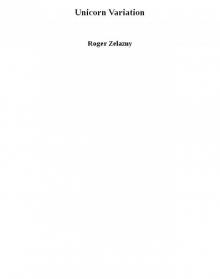 Unicorn Variation
Unicorn Variation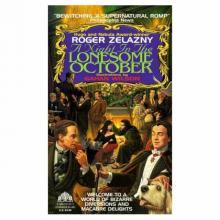 A Night in the Lonesome October
A Night in the Lonesome October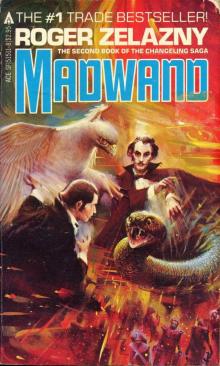 Madwand
Madwand Jack Of Shadows
Jack Of Shadows Lord of Light
Lord of Light The Doors of His Face, The Lamps of His Mouth and Other Stories
The Doors of His Face, The Lamps of His Mouth and Other Stories Guns Of Avalon tcoa-2
Guns Of Avalon tcoa-2 Coils
Coils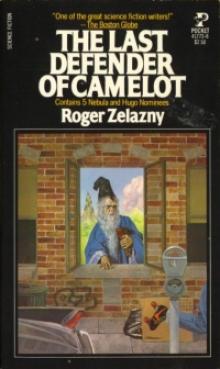 The Last Defender Of Camelot
The Last Defender Of Camelot Creatures of Light and Darkness
Creatures of Light and Darkness This Immortal
This Immortal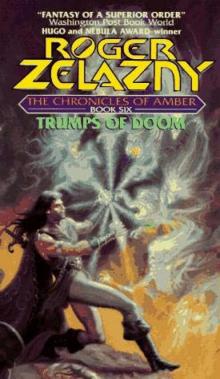 Trumps of doom tcoa-6
Trumps of doom tcoa-6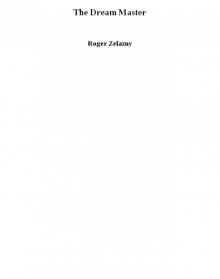 The Dream Master
The Dream Master The Complete Dilvish, The Damned
The Complete Dilvish, The Damned Nine Princes in Amber
Nine Princes in Amber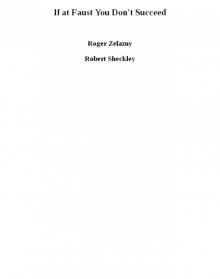 If at Faust You Don't Succeed
If at Faust You Don't Succeed Here there be dragons
Here there be dragons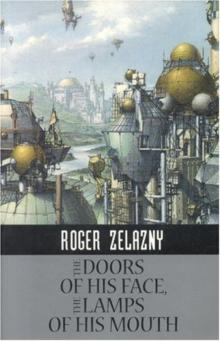 The Doors Of His Face, The Lamps Of His Mouth
The Doors Of His Face, The Lamps Of His Mouth The Great Book of Amber - Chronicles 1-10
The Great Book of Amber - Chronicles 1-10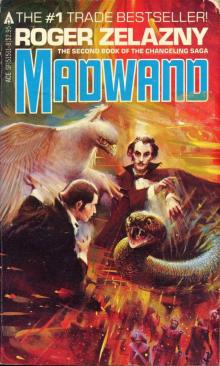 Madwand (Illustrated)
Madwand (Illustrated) The Chronicles of Amber
The Chronicles of Amber To Die In Italbar
To Die In Italbar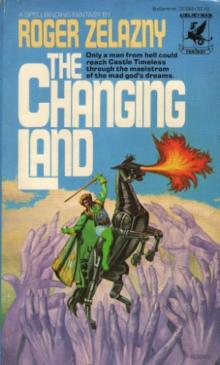 The Changing Land
The Changing Land The Furies
The Furies Nine Princes In Amber tcoa-1
Nine Princes In Amber tcoa-1 Last Of The Wild Ones
Last Of The Wild Ones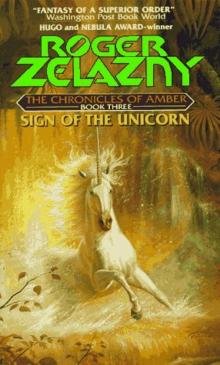 Sign of the Unicorn tcoa-3
Sign of the Unicorn tcoa-3 My Name is Legion
My Name is Legion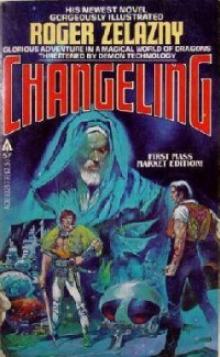 Wizard World 1: Changeling
Wizard World 1: Changeling Changeling
Changeling The Shroudling and the Guisel (amber stories)
The Shroudling and the Guisel (amber stories)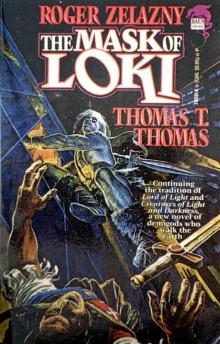 The Mask of Loki
The Mask of Loki A Farce To Be Reckoned With
A Farce To Be Reckoned With Roadmarks
Roadmarks When Pussywillows Last in the Catyard Bloomed (rtf)
When Pussywillows Last in the Catyard Bloomed (rtf) Hall of Mirrors (amber stories)
Hall of Mirrors (amber stories) Permafrost
Permafrost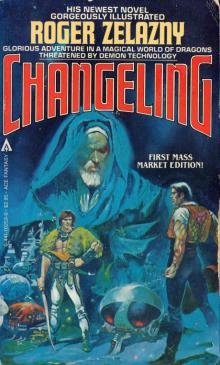 Changeling (Illustrated)
Changeling (Illustrated)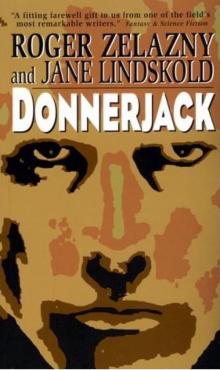 Donnerjack
Donnerjack Shadows & Reflections: A Roger Zelazny Tribute Anthology
Shadows & Reflections: A Roger Zelazny Tribute Anthology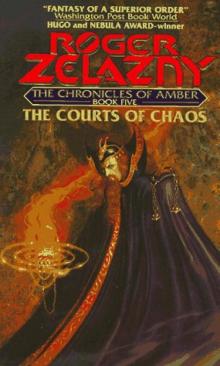 The Courts Of Chaos tcoa-5
The Courts Of Chaos tcoa-5 Flare
Flare Doorsways in the Sand
Doorsways in the Sand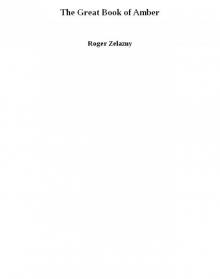 The Great Book of Amber
The Great Book of Amber Home Is the Hangman
Home Is the Hangman For a Breath I Tarry
For a Breath I Tarry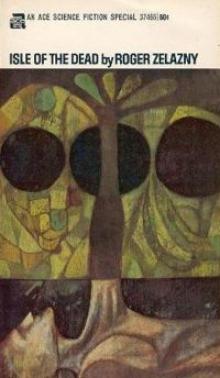 Isle Of The Dead
Isle Of The Dead Salesman Tale (amber stories)
Salesman Tale (amber stories) Dismal Light
Dismal Light Dilvish, The Damned
Dilvish, The Damned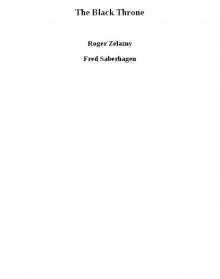 The Black Throne
The Black Throne Wizard World 2: Madwand
Wizard World 2: Madwand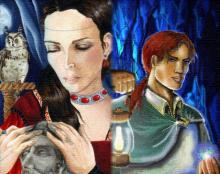 The Salesman's Tale
The Salesman's Tale